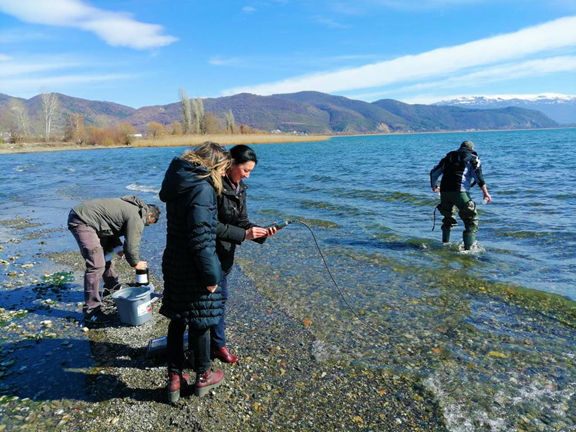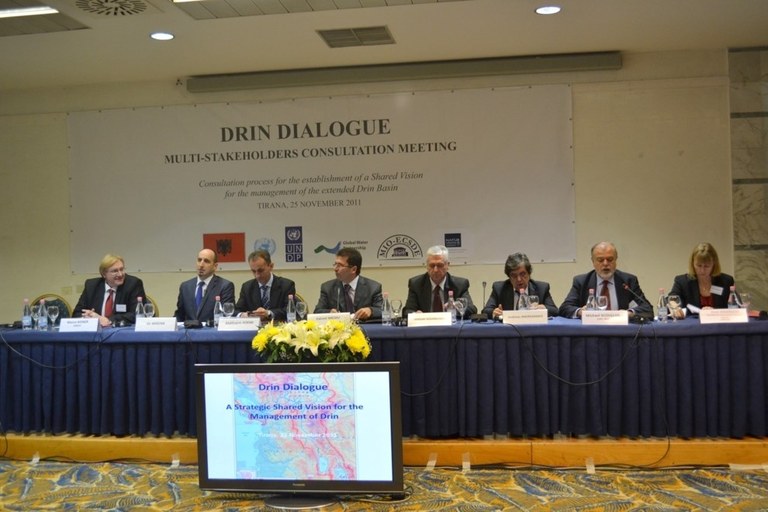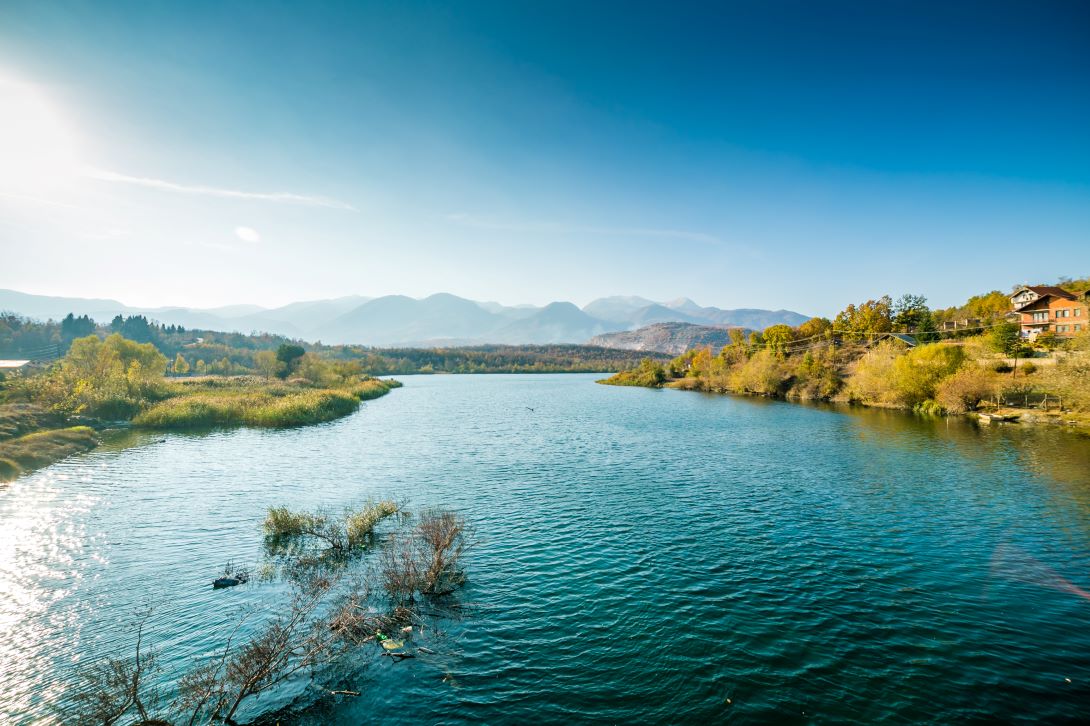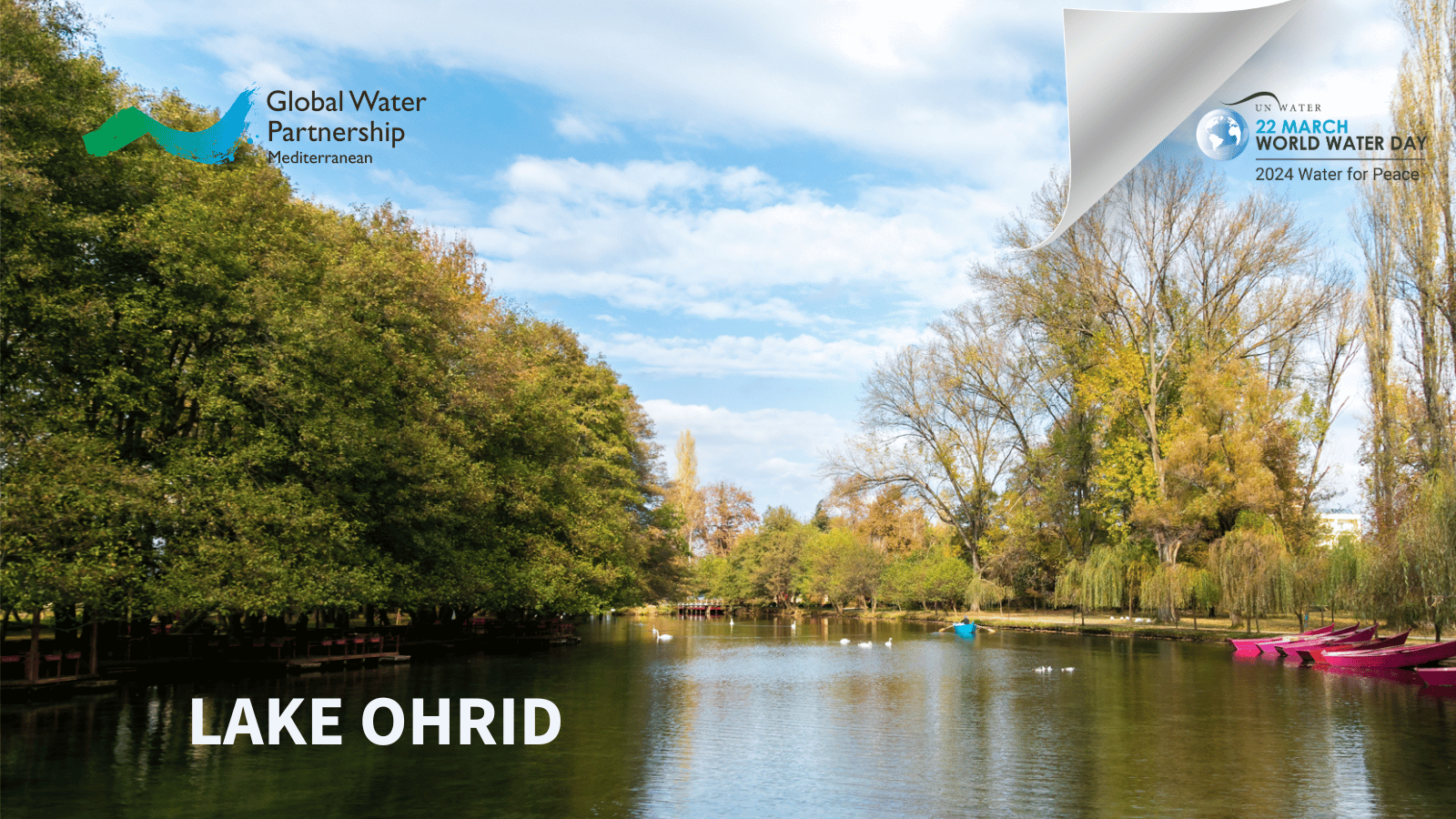Today, the Drin river basin, shared between Albania, Greece, Kosovo*, Montenegro and North Macedonia, enjoys a rare level of institutional collaboration for the sustainable management of its water resources. The Drin Strategic Action Programme (SAP), the result of a long process facilitated by GWP-Med, was signed between the 5 riparians in April 2020 and contains over 100 agreed policy and technical actions to address four transboundary issues that pose significant threats to nature and sustainable development. The roots of this wideranging collaboration go back deep in time, in the desire of two countries, Albania and North Macedonia in the early 90’s, to overcome seemingly insurmountable communication barriers, in order to protect Lake Ohrid, Europe’s oldest lake and part of the Drin river basin.
Today’s level of transboundary collaboration around shared water resources in Southeast Europe was once unthinkable. After the break-up of Yugoslavia, Albania and North Macedonia found themselves as two 'strangers’ with hardly any communication channels, let alone a plan to jointly protect their shared natural resource, Lake Ohrid. GWP-Med’s Project team who have supported Drin basin riparian collaboration for many years, explain how it came about.

The logo of "The Lake Ohrid Conservation Project" the first ever transboundary project on water management in the region.
Q. What triggered the start of the collaboration between Albania and North Macedonia to protect Lake Ohrid 25 years ago?
After the collapse of the old system in 90's, a new wave of perception of natural values appeared in the countries and their political agendas. For them, it was crucial to protect and manage in a sustainable way Lake Ohrid, an already proclaimed UNESCO natural and cultural heritage site since 1980. But, having in mind almost 50 years of no communication among the Lake's riparian countries, language barriers and cultural differences made it hard to find a way to promote basic political or economic cooperation. The aim of protection of the natural values of Lake Ohrid basin became, in practice, a vehicle to promote cooperation, to bring together scientists and experts and to encourage the flow of people and goods.
With the support of the Global Environment Facility (GEF) through the World Bank, the first ever transboundary project on water management in the region, “The Lake Ohrid Conservation Project” (1999-2004) was developed and successfully implemented. Political cooperation was made possible through the signing of a cooperation agreement that established the Lake Ohrid Management Board, scientists developed joint monitoring Committees, stakeholders participated in watershed committees and civil society worked on public awareness. Cooperation bloomed on many different levels thanks to the joint care for protecting precious Ohrid Lake.

Collecting samples from Lake Ohrid.
Q. What are some key highlights of this peacebuilding process?
Some of the most significant activities were those that enabled the cultivation of communication and cooperation. Political leadership agreed in February 2000 to proclaim June 21 as ‘Lake Ohrid Day’, which was celebrated every year in one of the three municipalities, Ohrid, Struga and Podragec, lying on the lake shore. The countries also developed the Joint Protocol for sampling and analysis and produced the first Joint State of Environment Report (2002). Most importantly, people from across the borders started gathering and sharing experiences.
In parallel, negotiations started for the development of the legal framework for future cooperation which resulted in the signing of the Joint Agreement for protection of the Lake Ohrid watershed (July 2004), later ratified by both Parliaments, establishing the Joint Bilateral Committee and Secretariat. All the achievements were internationally recognized under the Athens/Petersburg II process in 2003, whereby, during the Athens Declaration, the Lake Ohrid Conservation Project (LOCP) was showcased as an experience and knowledge to be replicated in the management of the other transboundary watersheds. This recognition triggered the idea of spreading the Lake Ohrid experience to the entire Drin River Basin management, where Lake Ohrid sub-basin belongs.

In 2011, the Drin Riparians signed the MoU which provided the political framework for and defined the context for their collaboration.
Q. How did this experience set the scene for broader collaboration among the 5 riparians for the entire Drin basin?
Cultivating a culture of collaboration on water management in the region and investing in human capabilities for future actions was key. It was a very rare experience for the region that human resources remained active after the ending of the projects in the field, available for implementing the next stages. Even political relations among relevant Ministries were steadily strengthened, especially in the case of decisions for the management of the Lake water level in the face of climate variability, as well as management of floods and droughts in the Basin.
All this formed a solid basis for the development of the initiative for the joint management of the Drin River Basin through the signing of the Drin Memorandum of Understanding (November 2011) among the 5 Riparians, Albania, Greece, Kosovo*, Montenegro and North Macedonia, in which GWP-Med played a pivotal role. The MoU provided the political framework for and defined the context for the collaboration between the Riparians with the main objective to: “Promote joint action for the coordinated integrated management of the shared water resources in the Drin Basin, as a means to safeguard and restore, to the extent possible, the ecosystems and the services they provide, and to promote sustainable development across the Drin Basin”.
This collaboration has yielded concrete results and is continuing to expand. The Drin Strategic Action Programme (SAP) was endorsed by high-level representatives of the five Riparians in April 2020, while the Lake Ohrid Watershed Management Plan has been developed to facilitate collaboration between Albania and North Macedonia around their shared precious lake.

The Drin Basin today enjoys a rare level of institutional collaboration for the sustainable management of its water resources.
It has been very rewarding to see the GEF project, “Enabling Transboundary Cooperation and Integrated Water Resources Management in the extended Drin River Basin” (Drin Project) implemented by the United Nations Development Program (UNDP) and executed by GWP-Med, make such a substantial contribution to these outcomes.
* *All references to Kosovo are made in the context of UN Security Council Resolution 1244 (1999)
